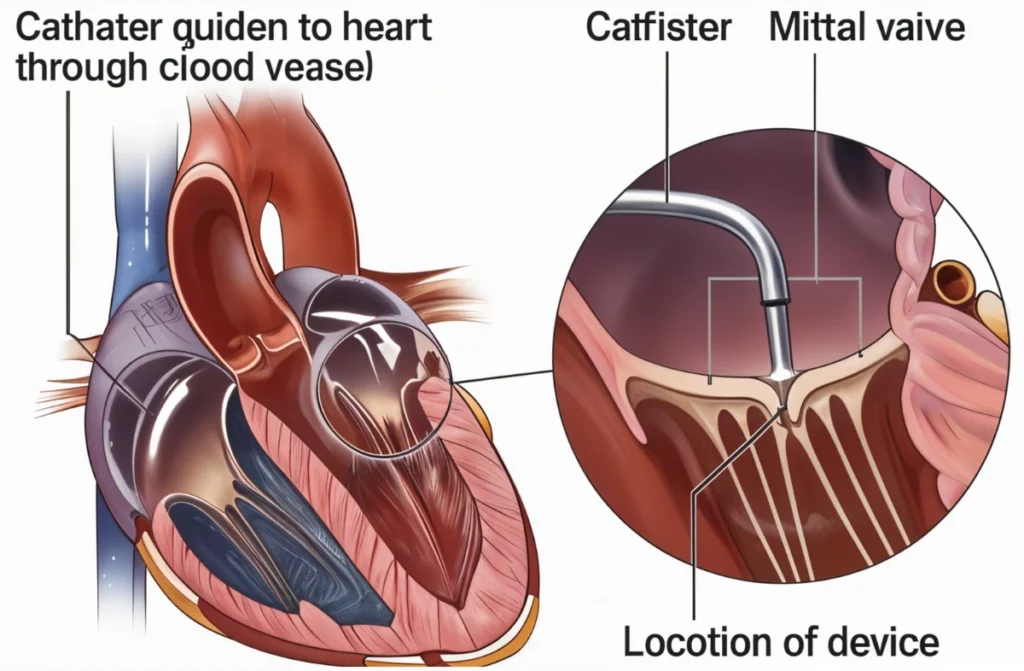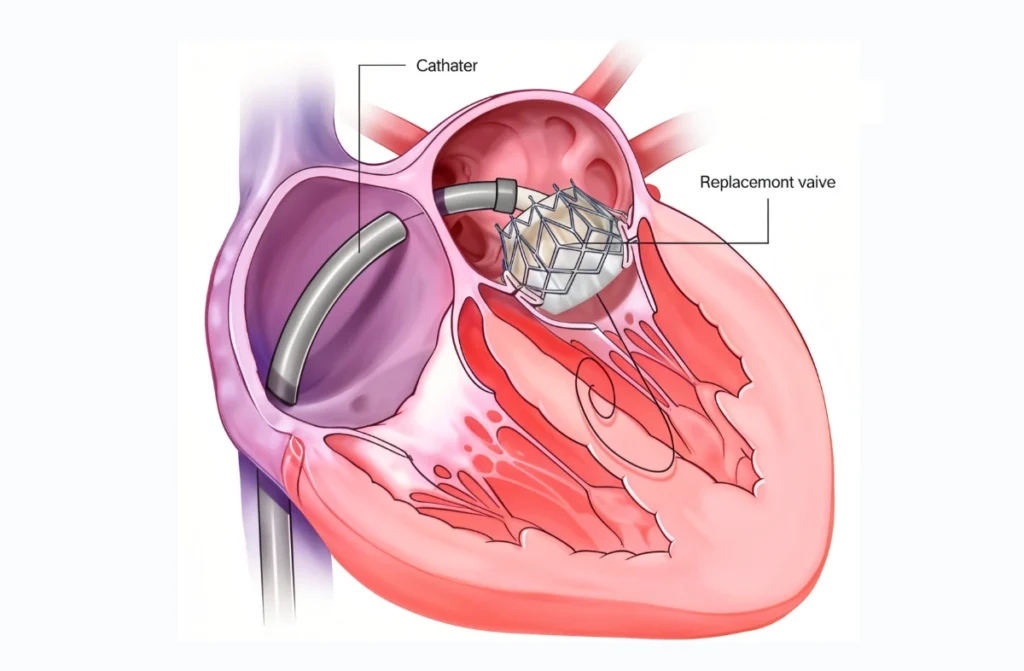Transcatheter Mitral Valve Replacement in Chennai (TMVR) is a groundbreaking approach transforming cardiac care for patients with severe mitral valve disease. The TMVR procedure in Chennai provides a minimally invasive option that reduces the need for open-heart surgery, making it particularly advantageous for high-risk patients.
The TMVR procedure involves replacing a malfunctioning mitral valve with a prosthetic one, delivered via a catheter-based system. This innovative technique allows for a quicker recovery and reduces complications associated with traditional surgery. This article delves into the TMVR procedure in Chennai, including patient selection criteria, step-by-step details of the procedure, its benefits, and potential risks. We’ll also explore the future prospects of the TMVR procedure and how it’s poised to reshape the treatment of mitral valve disease, offering renewed hope to patients worldwide.
What is Transcatheter Mitral Valve Replacement?
Transcatheter Mitral Valve Replacement (TMVR) is a minimally invasive procedure designed to treat mitral valve disease. Unlike traditional open-heart surgery, which requires a large incision, TMVR procedure in Chennai, allows surgeons to replace the damaged mitral valve using catheters inserted through small incisions. This innovative approach is especially beneficial for patients who are at high risk for conventional surgery. The transcatheter mitral valve replacement in Chennai utilizes advanced imaging and catheter-based techniques to ensure precision. By restoring proper valve function, TMVR can significantly alleviate symptoms such as shortness of breath and fatigue, enhancing patients’ quality of life.
Best Transcatheter Mitral Valve Replacement Doctor In Chennai
When it comes to Transcatheter Mitral Valve Replacement in Chennai, finding an experienced specialist is crucial for optimal results. Dr. M. Kathiresan, one of the leading TMVR mitral valve in Chennai, has vast experience in handling complex heart conditions and performing minimally invasive procedures.
- Dr. M. Kathiresan is known for his expertise in TMVR procedures, ensuring that patients with mitral valve disease receive the best care possible.
- He has extensive training and has performed numerous TMVR replacement in Chennai, procedures with a high success rate.
- Patients benefit from Dr. Kathiresan’s personalized approach, where he evaluates each case carefully to determine whether TMVR is the best option.
Dr. M. Kathiresan’s approach to TMVR mitral valve in Chennai, treatment combines advanced technology and his deep understanding of cardiology. This ensures patients receive a safe and effective solution for mitral valve issues, avoiding the need for open-heart surgery. His commitment to patient care makes him one of the most sought-after doctors for Transcatheter Mitral Valve Replacement in Chennai.

Understanding Mitral Valve Disease
Mitral valve disease involves dysfunction of the mitral valve, which controls blood flow between the left atrium and ventricle. It includes:
- Mitral Stenosis: Narrowing of the valve opening, restricting blood flow.
- Mitral Regurgitation: Valve doesn’t close properly, causing blood to leak back into the atrium.
Causes include congenital defects, age-related changes, infections (like endocarditis), or heart conditions (such as mitral valve prolapse). Symptoms range from fatigue and shortness of breath to heart palpitations and fluid retention. Treatment depends on severity and may involve medications, minimally invasive procedures (like MitraClip), or surgical interventions to repair or replace the valve.
Read also: Rotational Atherectomy Treatment in Chennai
Treatment Options
Traditional treatment options for mitral valve disease typically involve surgical interventions aimed at repairing or replacing the dysfunctional valve:
- Mitral Valve Repair: Preferred over replacement when possible, as it preserves the native valve tissue. Techniques include annuloplasty (repairing the valve ring) and leaflet repair to restore proper function.
- Mitral Valve Replacement: In cases where repair is not feasible, the valve is replaced with a mechanical valve (durable but requires lifelong blood thinners) or a biological valve (made from animal tissue, doesn’t require lifelong blood thinners).
- Open-Heart Surgery: Generally performed through a sternotomy (chest incision) under general anesthesia. It allows direct access to the heart for precise repair or replacement.
These traditional approaches offer effective treatment for severe mitral stenosis or regurgitation, improving symptoms and enhancing quality of life. However, they involve longer recovery times and higher risks compared to newer, minimally invasive percutaneous options like MitraClip for selected patients.
Rise of Transcatheter Mitral Valve Replacement in Chennai (TMVR)
Transcatheter Mitral Valve Replacement in Chennai emerged as an innovative solution to address the limitations of traditional mitral valve surgery. This procedure utilizes advanced catheter-based technology to implant a prosthetic valve within the native mitral valve.
TMVR can be performed through different approaches, such as transseptal or transapical access, depending on patient-specific factors. The development of TMVR has opened new avenues for patients who were previously deemed ineligible for surgery or at high risk.
Process
Transcatheter Mitral Valve Replacement (TMVR) is a minimally invasive procedure used to replace a diseased mitral valve using the following steps:
- Catheter Insertion: A catheter is inserted into a blood vessel, usually in the groin or chest, and guided towards the heart.
- Valve Delivery: A collapsible replacement valve is mounted on the catheter and advanced to the heart through imaging guidance (fluoroscopy and echocardiography).
- Valve Placement: Once positioned correctly, the new valve is expanded, pushing aside the old valve leaflets, and secured in place.
- Function Testing: The valve’s function is tested to ensure proper blood flow through the heart.
- Closure: The catheter is removed, and the insertion site is closed, typically requiring only small incisions.
TMVR offers advantages such as shorter recovery times and reduced risks compared to traditional open-heart surgery, making it suitable for patients deemed high-risk for surgical valve replacement.
Procedure
- Preoperative Assessment:
- Patients undergo comprehensive tests, including echocardiograms and CT scans, to evaluate the mitral valve and heart function.
- Anesthesia:
- Local anesthesia is administered, often combined with sedation, to ensure the patient is comfortable during the TMVR replacement in Chennai.
- Accessing the Heart:
- A small incision is made, usually in the groin, to access the femoral artery. A catheter is then guided to the heart.
- Valve Replacement:
- The new mitral valve is delivered through the catheter and positioned within the diseased valve, expanding to take its place.
- Monitoring and Recovery:
- After the procedure, patients are monitored in a recovery unit before returning home, typically within a few days.
Causes
- Mitral Regurgitation:
- This condition occurs when the mitral valve does not close properly, causing blood to flow backward into the heart. It is one of the most common reasons for transcatheter mitral valve replacement in Chennai.
- Mitral Stenosis:
- Narrowing of the mitral valve opening, which restricts blood flow, often necessitates a TMVR mitral valve in Chennai
- Degenerative Valve Disease:
- Age-related changes or conditions such as rheumatic fever can lead to deterioration of the mitral valve, making TMVR a suitable treatment option.
- High Surgical Risk:
- Patients who are not candidates for traditional surgery due to age or health complications may benefit from TMVR replacement in Chennai, allowing them to receive necessary treatment without the risks of open-heart surgery.

Benefits and Potential Risks
Benefits
- Minimally Invasive: Involves smaller incisions or catheter-based access, reducing recovery time and hospital stay.
- High-Risk Patient Suitability: Ideal for patients with multiple comorbidities who may not tolerate traditional open-heart surgery.
- Symptom Relief: Improves symptoms such as fatigue, shortness of breath, and chest pain associated with mitral valve disease.
- Preserves Anatomy: Unlike valve replacement, TMVR can preserve the native valve structure when feasible, potentially leading to better long-term outcomes.
- Quality of Life Improvement: Enhances overall quality of life by restoring proper heart function and reducing symptoms.
Potential Risks
- Vascular Complications: Risks associated with catheter insertion, such as bleeding or damage to blood vessels.
- Valve-related Issues: Possible complications like improper valve positioning, leakage, or device malfunction requiring further intervention.
- Infection: Risk of infection at the catheter insertion site or within the heart.
- Stroke: Small risk of embolism or clot formation during the procedure.
- Limited Long-Term Data: As a relatively newer technique, long-term durability and effectiveness of TMVR compared to traditional surgery may still require further study.
Transcatheter Mitral Valve Replacement (TMVR) offers a promising alternative for patients requiring mitral valve intervention, balancing potential benefits with associated risks that are carefully evaluated based on individual patient factors and condition severity.
Potential Risks and Complications of TMVR
While Transcatheter Mitral Valve Replacement (TMVR) offers a minimally invasive alternative to open-heart surgery, it is essential to be aware of potential risks and complications associated with the procedure. These risks vary based on the patient’s overall health, the severity of mitral valve disease, and other underlying conditions.
1. Vascular Complications
Since TMVR involves inserting a catheter through a blood vessel, there is a risk of vascular injury, bleeding, or vessel damage, especially in patients with fragile arteries.
2. Valve Malpositioning or Malfunction
There is a possibility that the replacement valve may not be positioned correctly or may not function as intended, leading to paravalvular leak (blood leakage around the valve) or valve migration, which may require further intervention.
3. Blood Clots and Stroke
Blood clot formation can occur after the procedure, increasing the risk of stroke or embolism. To mitigate this risk, patients may need blood-thinning medications after TMVR.
4. Arrhythmias (Irregular Heartbeats)
Some patients may develop irregular heart rhythms, such as atrial fibrillation, after the procedure. In certain cases, a pacemaker may be required to regulate the heart’s rhythm.
5. Infection
Although rare, infections can develop at the catheter insertion site or inside the heart (endocarditis), which may necessitate antibiotics or further medical intervention.
6. Left Ventricular Outflow Tract Obstruction (LVOTO)
In some cases, the newly implanted valve may obstruct blood flow from the left ventricle to the aorta, leading to serious complications, including low blood pressure and heart failure.
7. Pericardial Effusion and Cardiac Tamponade
Fluid accumulation around the heart (pericardial effusion) can occur, potentially leading to cardiac tamponade, a life-threatening condition that requires immediate drainage.
8. Kidney Damage (Acute Kidney Injury)
Patients with pre-existing kidney disease may experience further deterioration in kidney function due to contrast dye exposure used in imaging during the procedure.
9. Coronary Artery Injury
Since the mitral valve is anatomically close to the coronary arteries, there is a risk of obstructing or damaging a coronary artery, which may lead to a heart attack or require additional interventions.
10. Mortality Risk
Although TMVR is a less invasive alternative, it still carries a small risk of death, particularly in patients with severe underlying conditions or complex anatomical challenges.
Conclusion
The Transcatheter Mitral Valve Replacement (TMVR) in Chennai represents a significant advancement in the treatment of mitral valve disease. By offering a less invasive alternative to open-heart surgery, the TMVR procedure provides renewed hope for patients previously limited by their medical condition or high surgical risk. As technology advances, the future looks promising for further enhancing the efficacy and accessibility of the Transcatheter Mitral Valve Replacement (TMVR) procedure, potentially transforming care standards for mitral valve disease management. Innovations in device design, imaging techniques, and procedural approaches continue to improve patient outcomes, reducing complications and expanding eligibility to a broader patient population.
Artificial intelligence and robotics are also playing a crucial role in refining procedural precision, ensuring optimal valve placement, and minimizing risks. Additionally, advancements in minimally invasive techniques are expected to shorten recovery times, making TMVR a more viable option for high-risk patients who are not candidates for traditional open-heart surgery.
Read also: Transcatheter Tricuspid Valve Replacement in chennai


